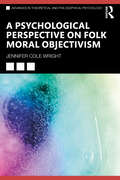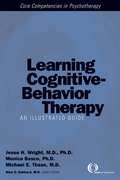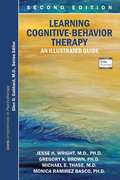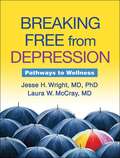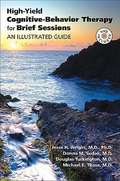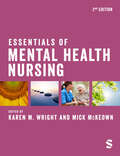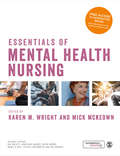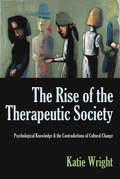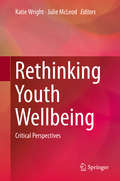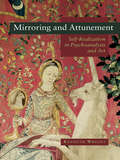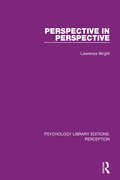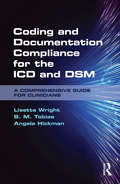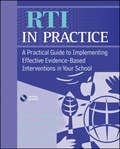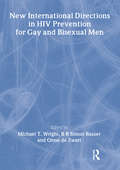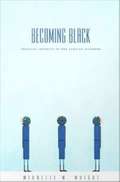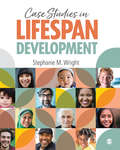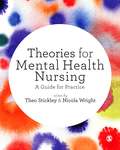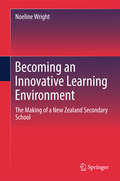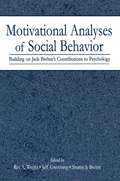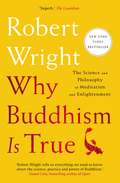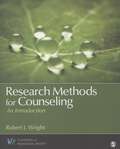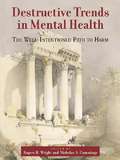- Table View
- List View
A Psychological Perspective on Folk Moral Objectivism (Advances In Theoretical And Philosophical Psychology Ser.)
by Jennifer Cole WrightA Psychological Perspective on Folk Moral Objectivism is a thoroughly researched interdisciplinary exploration of the critical role metaethical beliefs play in the way morality functions. Whether people are "moral objectivists" or not is something that deserves much more empirical attention than it has thus far received, not only because it bears upon philosophical claims but also because it is a critical piece of the puzzle of human morality. This book aims to facilitate incorporating the study of metaethical beliefs into existing research programs by providing a roadmap through the theoretical and empirical landscape as it currently exists and evaluating the methodological approaches used thus far. In doing so, it summarizes the key findings—both in terms of metaethical beliefs and their correlates, causes, and consequences—that have emerged, and explores the value of this area of study for anyone interested in the development, function, causes, and/or consequences of morality. A Psychological Perspective on Folk Moral Objectivism offers a helpful guide to social scientists interested in joining this thriving new area of research. It is a valuable resource for upper level undergraduates, postgraduates, and researchers in moral psychology, theoretical psychology, experimental philosophy, metaethics, and philosophy of the mind.
Learning Cognitive-Behavior Therapy: An Illustrated Guide
by Jesse H. Wright Monica R. Basco Michael E. ThaseLearning Cognitive-Behavior Therapy: An Illustrated Guide is designed to help both students and practitioners master the core methods of this proven form of psychotherapy. This easy-to-use guidebook offers full explanations of the most effective behavioral methods; a program designed for achieving competency that covers both basic methods for patients with depression and anxiety and advanced techniques for patients with bipolar disorder, psychoses, and eating and personality disorders; an integrated cognitive-behavioral/biological/interpersonal model for treatment; and instructions on fully integrating CBT with psychopharmacological intervention, as well as formulation and treatment methods endorsed by the Academy of Cognitive Therapy.
Learning Cognitive-Behavior Therapy: An Illustrated Guide (Core Competencies in Phychotherapy Ser.)
by Jesse H. Wright Monica Ramirez Basco Michael E. Thase Gregory K. Brown Glen O. GabbardBuilding on its successful -read-see-do- approach, this second edition of Learning Cognitive-Behavioral Therapy: An Illustrated Guide seamlessly combines 23 all-new videos with informative text and figures, charts, worksheets, checklists, and tables to help readers not only learn the essential skills of CBT but achieve competence in this important evidence-based treatment method. <P><P>Opening with an overview of core cognitive-behavior therapy (CBT) theories and techniques, leading CBT practitioners then describe and demonstrate how to build effective therapeutic relationships with CBT, conceptualize a case with the CBT model, structure sessions, and resolve common problems encountered in CBT. <P><P>This updated, second edition of the best-selling and highly popular Learning Cognitive-Behavioral Therapy also features: - Ways to employ CBT to reduce suicide risk- Guidance on integrating therapies related to CBT -- including dialectical behavior therapy, mindfulness-based cognitive therapy, and well-being therapy -- in the context of personality disorders and chronic or recurrent depression- An appendix of curated resources by the expert authors -- recommended readings, computer programs, Web sites, videos, and organizations -- to give readers access to the best resources in building competence in CBT practice <P><P>The all-new videos feature clinicians demonstrating methods in real-world settings and include new topics such as safety planning and uncovering and changing maladaptive schemas. Proven as one of the best teaching tools for building competence in CBT, this new edition will enrich readers' understanding and practice of CBT.
Breaking Free from Depression
by Jesse H. Wright Jesse W. MccrayWhen it comes to treating depression, one size definitely doesn't fit all. How do you find the science-based treatment that will work for you? What can you do to restore the fighting spirit and motivation that are so essential for overcoming this illness? Leading psychiatrist-researcher Jesse Wright and his daughter, Laura McCray, a family physician, have helped many thousands of depressed patients discover effective pathways to wellness. Here they describe powerful treatment tools and present a flexible menu of self-help strategies you can try today or turn to in the future. Dozens of easy-to-use worksheets and forms are included for you to complete in the book or download and print from the companion Web page. Learn proven ways to break the cycle of negative thinking, restore energy and a sense of well-being, strengthen your relationships, and make informed decisions about medications. You can beat depression and keep your life headed in a positive direction. This book shows how.
High-Yield Cognitive-Behavior Therapy for Brief Sessions: An Illustrated Guide
by Jesse H. Wright Douglas Turkington Donna M. Sudak Michael E. ThaseHigh-Yield Cognitive-Behavior Therapy for Brief Sessions: An Illustrated Guide breaks entirely new ground in explaining how to weave together the powerful tools of CBT with pharmacotherapy in sessions shorter than the traditional "50-minute hour. " Written for psychiatrists, therapists, and other clinicians, the book details ways to enrich brief sessions with practical CBT interventions that work to relieve symptoms and promote wellness. An engaging and instructive resource of video illustrations included with the book demonstrates how to successfully implement brief CBT sessions for some of the most common and important problems seen in clinical practice -- depression, anxiety, psychotic symptoms, suicidality, sleep disturbances, substance abuse, and coping with physical health issues. Written by practicing clinicians with extensive experience in combining CBT and pharmacotherapy, this volume builds on the constructs and techniques described in the authors' earlier best-selling illustrated guides, Learning Cognitive-Behavior Therapy and Cognitive-Behavior Therapy for Severe Mental Illness. The authors describe in detail the general features of CBT that can be applied in less time than the 50-minute hour #149; The therapist and patient function as an investigative team; the power of this collaborative empiricism can be evident in even the shortest of clinical encounters. #149; Clinicians teach patients how to rapidly set agendas, focus on specific problems, pace sessions, and give and receive feedback on progress; this structuring approach is especially well-suited to brief sessions. #149; A basic tenet of CBT, psychoeducation can effectively be delivered in sessions shorter than 45-60 minutes and, in fact, may become a more dominant aspect of treatment during briefer time frames. #149; Patients can learn practical, high-yield methods for decreasing symptoms fairly quickly, making these methods highly suitable for application in shorter sessions. #149; Homework extends learning beyond the confines of the session and encourages self-help in the treatment process, effectively increasing the value of shortened clinician-patient time. When sessions are brief, clinicians must be able to generate succinct and targeted formulations that include key pieces of information that allow for full understanding of the patient, while honing in on specific problems where positive results can be collaboratively pursued. This book, with its video illustrations and learning exercises, was designed to help readers achieve incisive formulations while they sharpen their basic CBT techniques and successfully apply this knowledge in the stimulating and rewarding domain of brief sessions. A must-read for working clinicians as well as trainees, this book offers pragmatic solutions for the challenge of providing effective psychotherapy in brief treatment sessions.
Essentials of Mental Health Nursing
by Karen M. Wright Mick McKeownAre you studying mental health nursing and want a book that covers all you need to know? Look no further. As it says in the name, this is an essential text for students. Split into 5 parts, this book delves into the context of mental health, key concepts and debates, skills for care and therapeutic approaches, tailoring care to people with specific needs, and transition to practice. Updated to include more content from those with lived experience, this new edition also includes: - Voices of mental health service users and practitioners, giving you a real insight in the field - Critical thinking stop points and debates, allowing you to develop your wider skills and knowledge - Case studies to bring the content to life - Chapter summaries, so you know what the main takeaways are for each chapter - Further reading and useful websites, allowing you to do your own research The editors, Karen M. Wright and Mick McKeown come with a wealth of experience in mental health nursing. The variety of contributors also reflect different experiences in different contexts.
Essentials of Mental Health Nursing
by Karen M. Wright Mick McKeownAre you studying mental health nursing and want a book that covers all you need to know? Look no further. As it says in the name, this is an essential text for students. Split into 5 parts, this book delves into the context of mental health, key concepts and debates, skills for care and therapeutic approaches, tailoring care to people with specific needs, and transition to practice. Updated to include more content from those with lived experience, this new edition also includes: - Voices of mental health service users and practitioners, giving you a real insight in the field - Critical thinking stop points and debates, allowing you to develop your wider skills and knowledge - Case studies to bring the content to life - Chapter summaries, so you know what the main takeaways are for each chapter - Further reading and useful websites, allowing you to do your own research The editors, Karen M. Wright and Mick McKeown come with a wealth of experience in mental health nursing. The variety of contributors also reflect different experiences in different contexts.
Essentials of Mental Health Nursing
by Karen Wright Reader Mick McKeownThis ground-breaking textbook gathers contributions from service users, expert practitioners and leading academics to help students develop the core knowledge and skills they need to qualify as mental health nurses. Focusing in particular on helping students apply person-centred, compassionate and recovery-focused care, service-user voices and practical case studies are integrated throughout the book. Students are also given a rounded understanding of the key debates they will face in practice through the exploration of both bio-medical and psycho-social approaches. Key features include: Voices and case studies from real practising nurses and students help students apply knowledge to practice. Critical thinking activities, debates, and ‘What’s the Evidence’ summaries help students develop higher level critical thinking and evidence based practice skills. Further reading and free SAGE journal articles facilitate independent learning. Online MCQs and Flashcards make revision simple and fun. The free interactive ebook gives students the freedom to learn anywhere! Online Lecturer resources: free MCQs, video debates, SAGE journal articles and more, which can be used for flipped classroom activities or lectures to make teaching more interactive.
Essentials of Mental Health Nursing
by Karen Wright Reader Mick McKeownThis ground-breaking textbook gathers contributions from service users, expert practitioners and leading academics to help students develop the core knowledge and skills they need to qualify as mental health nurses. Focusing in particular on helping students apply person-centred, compassionate and recovery-focused care, service-user voices and practical case studies are integrated throughout the book. Students are also given a rounded understanding of the key debates they will face in practice through the exploration of both bio-medical and psycho-social approaches. Key features include: Voices and case studies from real practising nurses and students help students apply knowledge to practice. Critical thinking activities, debates, and ‘What’s the Evidence’ summaries help students develop higher level critical thinking and evidence based practice skills. Further reading and free SAGE journal articles facilitate independent learning. Online MCQs and Flashcards make revision simple and fun. The free interactive ebook gives students the freedom to learn anywhere! Online Lecturer resources: free MCQs, video debates, SAGE journal articles and more, which can be used for flipped classroom activities or lectures to make teaching more interactive.
The Rise of the Therapeutic Society: Psychological Knowledge & the Contradictions of Cultural Change
by Katie WrightAn examination of the Western world’s contemporary fascination with psychological life, and the historical developments that fostered it. In this book, sociologist Katie Wright traces the ascendancy of therapeutic culture, from nineteenth-century concerns about nervousness, to the growth of psychology, the diffusion of an analytic attitude, and the spread of therapy and counseling, using Australia as a focal point. Wright’s analysis, which draws on social theory, cultural history, and interviews with therapists and people in therapy, calls into question the pessimism that pervades many accounts of the therapeutic turn and provides an alternative assessment of its ramifications for social, political, and personal life in the globalized West.Special Commendation, TASA Raewyn Connell Prize
Rethinking Youth Wellbeing
by Katie Wright Julie McleodThis volume offers a critical rethinking of the construct of youth wellbeing, stepping back from taken-for-granted and psychologically inflected understandings. Wellbeing has become a catchphrase in educational, health and social care policies internationally, informing a range of school programs and social interventions and increasingly shaping everyday understandings of young people. Drawing on research by established and emerging scholars in Australia, Singapore and the UK, the book critically examines the myriad effects of dominant discourses of wellbeing on the one hand, and the social and cultural dimensions of wellbeing on the other. From diverse methodological and theoretical perspectives, it explores how notions of wellbeing have been mobilized across time and space, in and out of school contexts, and the different inflections and effects of wellbeing discourses are having in education, transnationally and comparatively. The book offers researchers as well as practitioners new perspectives on current approaches to student wellbeing in schools and novel ways of thinking about the wellbeing of young people beyond educational settings.
Mirroring and Attunement: Self-Realization in Psychoanalysis and Art
by Kenneth WrightMirroring and Attunement offers a new approach to psychoanalysis, artistic creation and religion. Viewing these activities from a broadly relational perspective, Wright proposes that each provides a medium for creative dialogue: the artist discovers himself within his self-created forms, the religious person through an internal dialogue with ‘God’, and the analysand through the inter-subjective medium of the analysis. Building on the work of Winnicott, Stern and Langer, the author argues that each activity is rooted in the infant’s preverbal relationship with the mother who ‘holds’ the emerging self in an ambience of mirroring forms, thereby providing a ‘place’ for the self to ‘be’. He suggests that the need for subjective reflection persists throughout the life cycle and that psychoanalysis, artistic creation and religion can be seen as cultural attempts to provide the self with resonant containment. They thus provide renewed opportunities for holding and emotional growth. Mirroring and Attunement will provide essential reading for psychoanalysts, psychotherapists, and art therapists and be of interest to anyone working at the interface between psychoanalysis, art and religion.
Perspective in Perspective (Psychology Library Editions: Perception #35)
by Lawrence WrightOriginally published in 1983, this book is about the way we see things – or think we do, which is by no means the same – and about the ways in which we have tried to reproduce that visual concept in diagrams, pictures, photographs, films and television. Whatever the medium, if any degree of realism is intended, some use of perspective is inevitable, and some understanding of it can aid the appreciation of the result. But here the technicalities of perspective geometry are treated as far as possible non-technically, by a common-sense approach. Students, would-be artists or architects, are warned in the Preface that they will travel second-class in the author’s train of thought (the ‘general reader’ coming first), but they may well find the journey worthwhile in that it provides a background to a subsequent, more detailed studies. Lawrence Wright shows that every form of perspective representation has some innate falsity, but that most such forms offer an adequate makeshift; that rules of geometry often need to be bent; that labour-saving dodges and shortcuts exist. As he says, perspective drawing, like politics, is an art of the possible. In reading this book, beginners may find it all simpler than they had supposed, though the established expert may in some interesting respects find just the opposite. The general reader may thereafter find himself seeing things – and representations of them – in a new light.
Coding and Documentation Compliance for the ICD and DSM: A Comprehensive Guide for Clinicians
by Lisette Wright S. M. Tobias Angela HickmanCoding and Documentation Compliance for the ICD and DSM provides professionals, professors, and students with a logical and practical way of understanding a difficult topic in healthcare for the clinician: coding. Established professionals will find the tools they need to comply with the ICD series, HIPAA, and integrated care models. Professors and students will appreciate having a systemized, standardized approach to teaching and learning the more complex aspects of ICD compliance. The interplay between the ICD and DSM manuals is also explicated in clear terms.
RTI in Practice: A Practical Guide to Implementing Effective Evidence-Based Interventions in Your School
by Wright Mcdougal James A. James L. Graney Suzanne B. Ardoin Scott P.A must-have resource for educational professionals implementing Response to Intervention (RTI) programs in their schools RTI in Practice: A Practical Guide to Implementing Effective Evidence-Based Interventions in Your School is an innovative and timely guide that presents concrete, balanced perspectives and directions for implementing an effective RTI model in your school. Built upon the three tiers of effective general education and universal screening, targeted interventions, and intensive interventions, this authoritative resource addresses: Effective academic programs for all students How to use data to make decisions in general education Guidelines for setting goals, monitoring progress, and graphing intervention outcomes Multicultural considerations Realistic case scenarios appear throughout to bring the implementation strategies to life, and the book is packaged with a CD-ROM containing numerous reproducible and customizable forms, surveys, and screening tools, as well as an annotated list of resources for charting and monitoring individual student and classroom progress. RTI in Practice: A Practical Guide to Implementing Effective Evidence-Based Interventions in Your School is a complete resource providing educators and school professionals with the tips?and tools needed for successful RTI program implementation.
New International Directions in HIV Prevention for Gay and Bisexual Men
by Michael Wright B R RosserIt is widely recognized that current HIV intervention models are falling short of their goals. What are the alternatives?To answer this question, New International Directions in HIV Prevention for Gay and Bisexual Men presents a collection of articles from European and American authors that rival dominant paradigms of HIV prevention. Researchers, practitioners, and community organizations will be challenged to examine current assumptions and to consider neglected aspects of risk behavior such as love, trust, and the dynamics of sexual intimacy. New International Directions in HIV Prevention for Gay and Bisexual Men explores models and theories that will help you develop more effective HIV prevention programs to better serve patients and clients.New International Directions in HIV Prevention for Gay and Bisexual Men offers you fresh perspectives on prevention work by examining risk behaviors in the interactional, communal, and social contexts in which they are practiced. You will receive alternative explanations and reasons for HIV risk that go beyond current approaches and that introduce possibilities for new intervention strategies. Written by experts in the field, the chapters in New International Directions in HIV Prevention for Gay and Bisexual Men will give you insight into new ideas and developments, including: placing a greater emphasis on improving successful risk management strategies as opposed to quantifying risk factors examining the meaning and context of sexual acts which occur in casual encounters or steady partnerships and incorporating their relevancy into prevention work considering the effects that cultural context and socially constructed meanings have on prevention work and incorporating individuals’values and feelings into prevention strategies focusing on more realistic goals of harm reduction that take sexual decision making into consideration as opposed to expecting abstinence relating the various aspects of sexual encounters--physical attraction, intimacy, reciprocity, and power--to reasons why men choose not to use condomsExamining how gay men can underestimate the risk of HIV in order to meet needs of intimacy, New International Directions in HIV Prevention for Gay and Bisexual Men will help you understand the symbolic dimension of sexual contact. The normal, everyday reasons for having sex without a condom are explored, questioning models which often characterize unprotected sex as being the result of low self-esteem, substance abuse, or some other psychological vulnerability. Presenting data from both qualitative and quantitative research conducted at group and individual levels, this book reveals the complexity of risk behavior, the richness of sexual experience, and the importance of respecting the unique context in which gay men live their sexual lives. New International Directions in HIV Prevention for Gay and Bisexual Men will help you understand this point of view, enabling you to provide patients and clients with more effective HIV prevention and risk management services.
Becoming Black: Creating Identity in the African Diaspora
by Michelle M. WrightBecoming Black is a powerful theorization of Black subjectivity throughout the African diaspora. In this unique comparative study, Michelle M. Wright discusses the commonalties and differences in how Black writers and thinkers from the United States, the Caribbean, Africa, France, Great Britain, and Germany have responded to white European and American claims about Black consciousness. As Wright traces more than a century of debate on Black subjectivity between intellectuals of African descent and white philosophers, she also highlights how feminist writers have challenged patriarchal theories of Black identity. Wright argues that three nineteenth-century American and European works addressing race--Thomas Jefferson's Notes on the State of Virginia, G. W. F. Hegel's Philosophy of History, and Count Arthur de Gobineau's Essay on the Inequality of the Human Races--were particularly influential in shaping twentieth-century ideas about Black subjectivity. She considers these treatises in depth and describes how the revolutionary Black thinkers W. E. B. Du Bois, Aim Csaire, Lopold Sdar Senghor, and Frantz Fanon countered the theories they promulgated. She explains that while Du Bois, Csaire, Senghor, and Fanon rejected the racist ideologies of Jefferson, Hegel, and Gobineau, for the most part they did so within what remained a nationalist, patriarchal framework. Such persistent nationalist and sexist ideologies were later subverted, Wright shows, in the work of Black women writers including Carolyn Rodgers and Audre Lorde and, more recently, the British novelists Joan Riley, Naomi King, Jo Hodges, and Andrea Levy. By considering diasporic writing ranging from Du Bois to Lorde to the contemporary African novelists Simon Njami and Daniel Biyaoula, Wright reveals Black subjectivity as rich, varied, and always evolving.
Case Studies in Lifespan Development
by Ms. Stephanie M. WrightCase Studies in Lifespan Development offers students a comprehensive view into life’s key developmental stages through unique, diverse, and moving cases. Author Stephanie M. Wright presents a series of 12 case studies shaped by the contributions of real students—including their observations, concerns, and moments of triumph—to build immersive examples that readers can relate to and enjoy.
Case Studies in Lifespan Development
by Ms. Stephanie M. WrightCase Studies in Lifespan Development offers students a comprehensive view into life’s key developmental stages through unique, diverse, and moving cases. Author Stephanie M. Wright presents a series of 12 case studies shaped by the contributions of real students—including their observations, concerns, and moments of triumph—to build immersive examples that readers can relate to and enjoy.
Theories for Mental Health Nursing: A Guide for Practice
by Nicola Wright Theo StickleyAn understanding of the theories that shape and define mental health policy and practice is essential for every mental health nurse. This book gives you the knowledge you need to understand those complex and varying theories, concepts and approaches. It helps you to deconstruct mental health and become a critical practitioner by drawing on a wealth of literature and research. Topics covered include cognitive behavioural therapy, recovery, risk and critical theories. Every Chapter includes: - Learning objectives and chapter summaries which highlight the key points. - A detailed case study which challenges you to relate theory to practice. - An explanation of the advantages and disadvantages of each approach. It will be essential reading for all students of mental health nursing at pre-registration and practitioner level. It will also be valuable reading for those taking broader courses in mental health. Theo Stickley is Associate Professor of Mental Health at the University of Nottingham. Nicola Wright is Lecturer in Mental Health at the University of Nottingham.
Becoming an Innovative Learning Environment: The Making of a New Zealand Secondary School
by Noeline WrightThis book traces how a new school, physically designed as a modern learning environment, has come into being in New Zealand. A key feature is how it designs its curriculum for future citizens. The book explores how flexible curriculum and assessment options support the provision of a well-balanced, coherent and future-oriented learning programme. It also illustrates how the school is implementing its vision and copes with being different from other schools which understand and embody the New Zealand Curriculum as well as the NCEA qualifications system in more traditional terms. School leaders’, teachers’ and foundation students’ thinking and perspectives about what it’s like to become a new school are highlighted and shed light on what is possible within an evolving education system.
Motivational Analyses of Social Behavior: Building on Jack Brehm's Contributions to Psychology
by Rex A. Wright Jeff Greenberg Sharon S. BrehmThis book honors Jack W. Brehm's contributions to psychology, all of which revolve around a central theme of motivation and social behavior. It begins with two personal chapters and then presents a collection of cutting-edge, substantive chapters authored by researchers whose work Brehm has strongly influenced. It concludes with a chapter by Jack Brehm that reflects on the field of psychology, discusses a new theory of social influence, and offers ideas about the direction in which our understanding of human behavior could move. Motivational Analyses of Social Behavior will be of value to research scientists, educators, and practitioners interested in social motivational processes and those who developed major theories in this area. Interested readers include individuals specializing in social, clinical, organizational, personality, health, and motivational psychology, and psychophysiology. The book would also be ideal for advanced courses on social motivation and the history of psychology.
Why Buddhism is True: The Science and Philosophy of Meditation and Enlightenment
by Robert Wright<P>From one of America’s greatest minds, a journey through psychology, philosophy, and lots of meditation to show how Buddhism holds the key to moral clarity and enduring happiness. <P>Robert Wright famously explained in The Moral Animal how evolution shaped the human brain. The mind is designed to often delude us, he argued, about ourselves and about the world. And it is designed to make happiness hard to sustain. But if we know our minds are rigged for anxiety, depression, anger, and greed, what do we do? <P>Wright locates the answer in Buddhism, which figured out thousands of years ago what scientists are only discovering now. Buddhism holds that human suffering is a result of not seeing the world clearly—and proposes that seeing the world more clearly, through meditation, will make us better, happier people. <P>In Why Buddhism is True, Wright leads readers on a journey through psychology, philosophy, and a great many silent retreats to show how and why meditation can serve as the foundation for a spiritual life in a secular age. <P>At once excitingly ambitious and wittily accessible, this is the first book to combine evolutionary psychology with cutting-edge neuroscience to defend the radical claims at the heart of Buddhist philosophy. With bracing honesty and fierce wisdom, it will persuade you not just that Buddhism is true—which is to say, a way out of our delusion—but that it can ultimately save us from ourselves, as individuals and as a species. <P><b>A New York Times Bestseller</b>
Research Methods For Counseling: An Introduction
by Robert J. WrightResearch Methods for Counseling: An Introduction provides a rich, culturally sensitive presentation of current research techniques in counseling. Author Robert J. Wright introduces the theory and research involved in research design, measurement, and assessment with an appealingly clear writing style. He addresses ways to meet the requirements of providing the data needed to facilitate evidence-based therapy and interventions with clients, and also explains methods for the evaluation of counseling programs and practices. This comprehensive resource covers a broad range of research methods topics including qualitative research, action research, quantitative research including, sampling and probability, and probability-based hypothesis testing. Coverage of both action research and mixed methods research designs are also included.
Destructive Trends in Mental Health: The Well Intentioned Path to Harm
by Rogers H. Wright Nicholas A. CummingsThis book takes as its inspiration the assumption that the atmosphere of intellectual openness, scientific inquiry, aspiration towards diversity, and freedom from political pressure that once flourished in the American Psychological Association has been eclipsed by an "ultra-liberal agenda," in which voices of dissent, controversial points of view, and minority groups are intimidated, ridiculed and censored. Chapters written by established and revered practitioners explore these important issues within the contexts of social change, the ways in which mental health services providers view themselves and their products, and various economic factors that have affected healthcare cost structure and delivery. In short, this book is intended to help consumers, practitioners, and policy makers to become better educated about a variety of recent issues and trends that have significantly changed the mental health fields.
